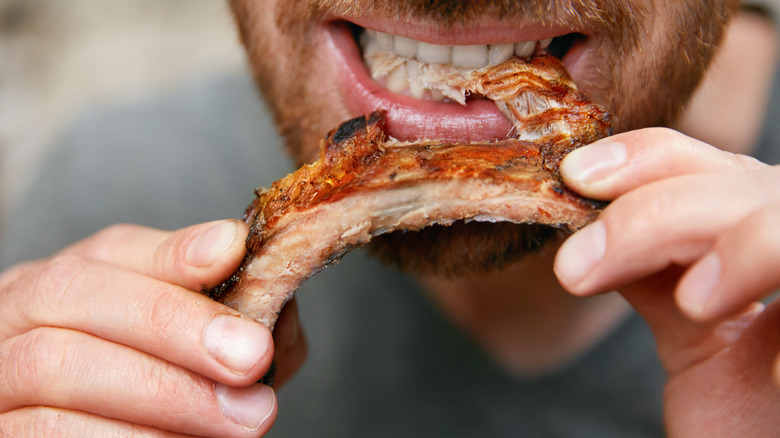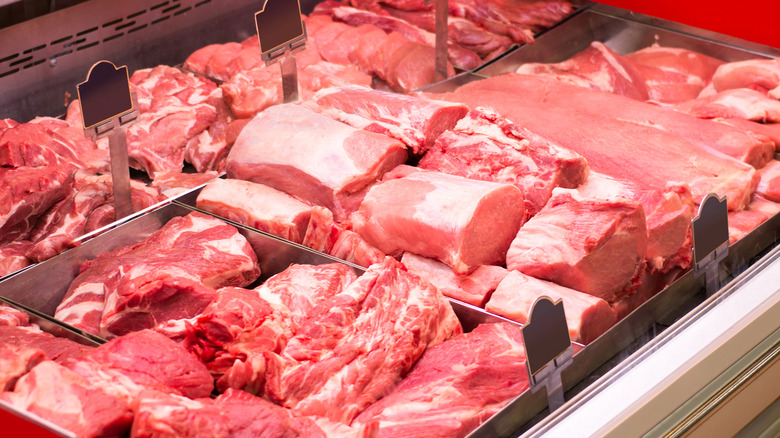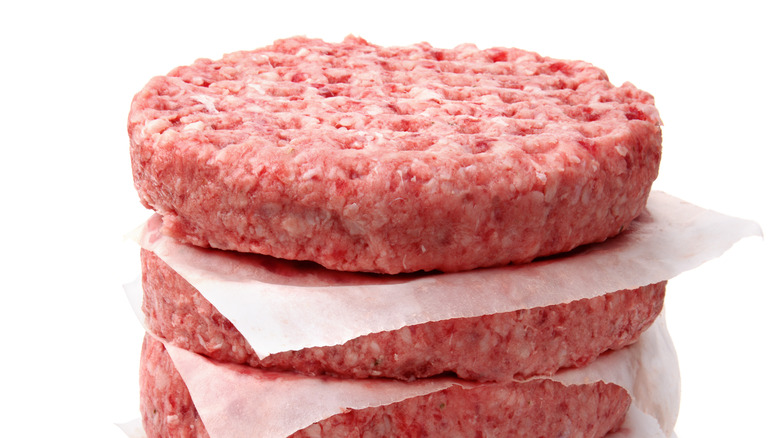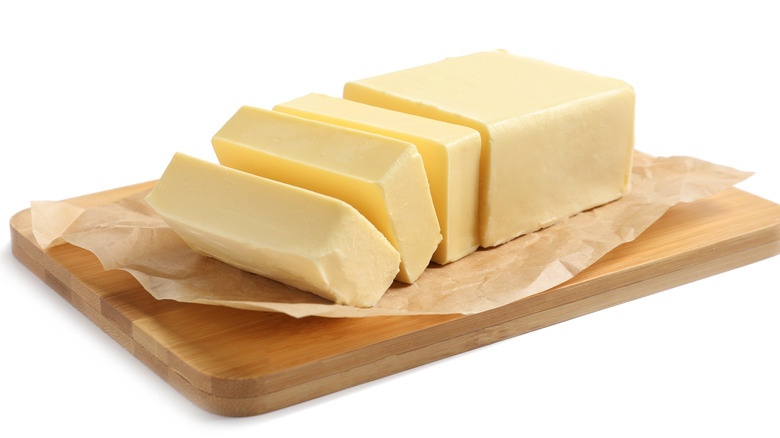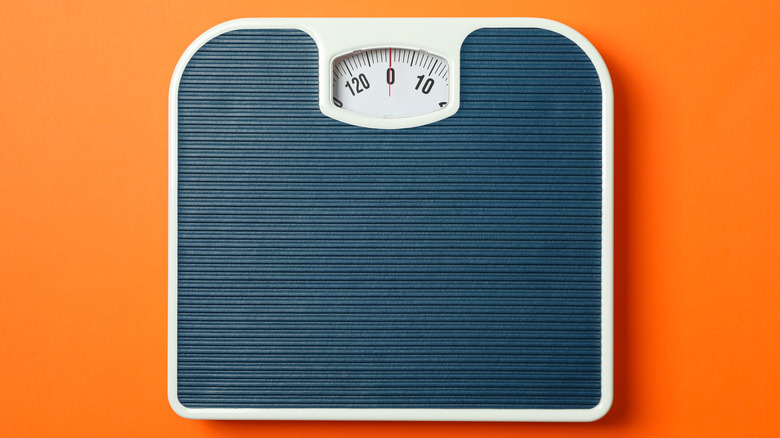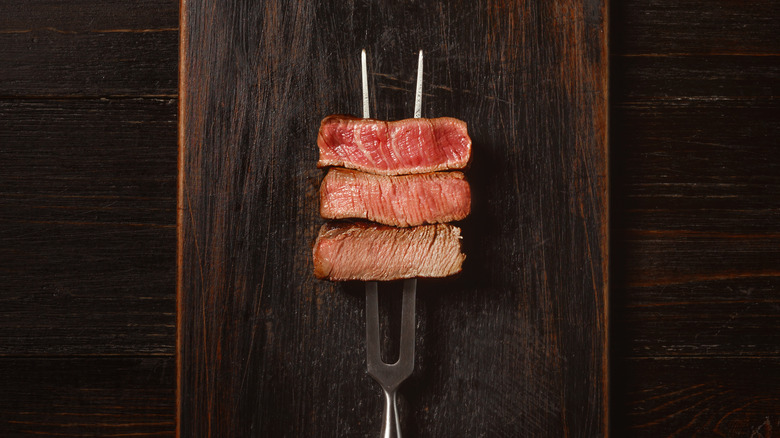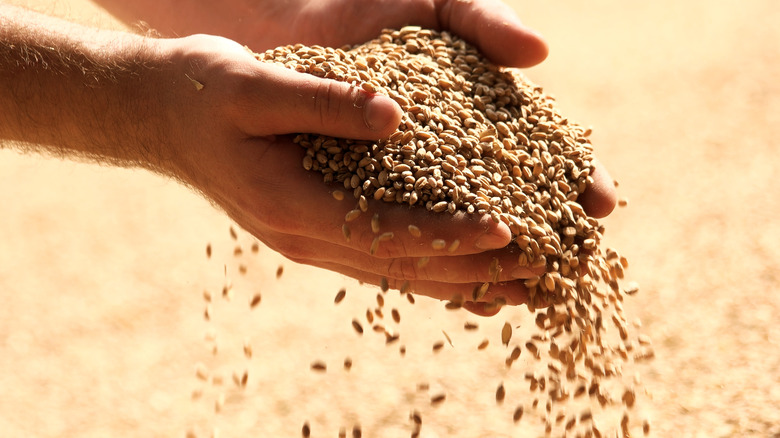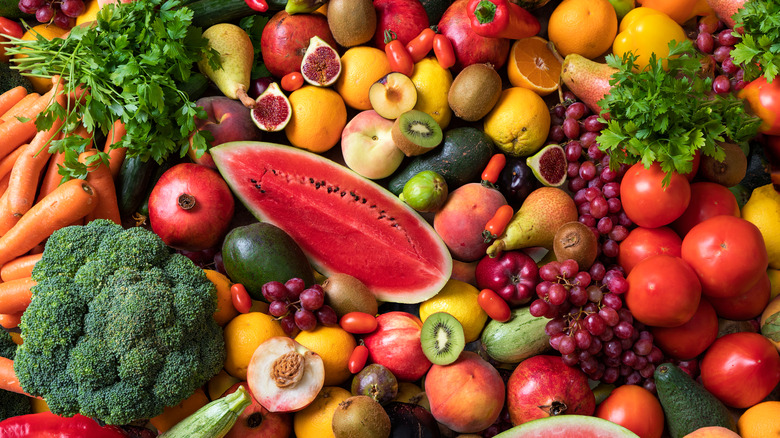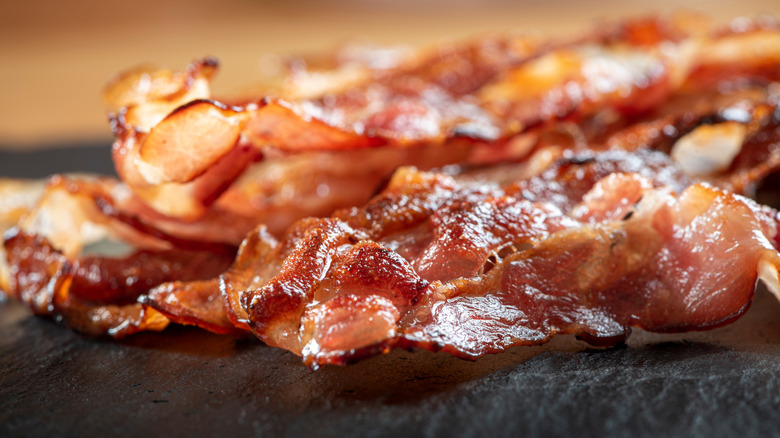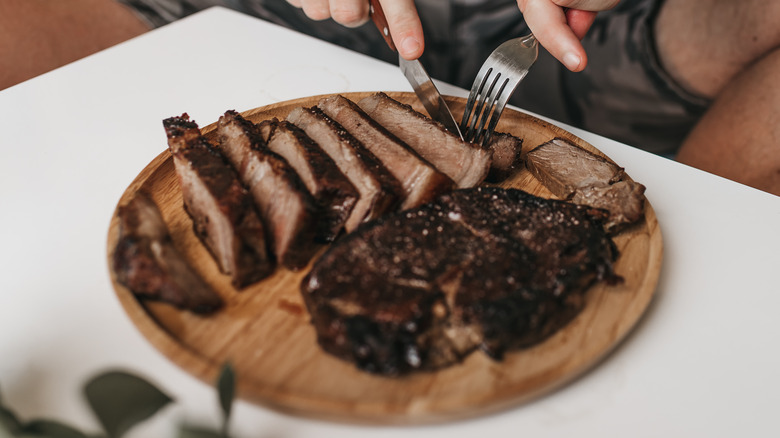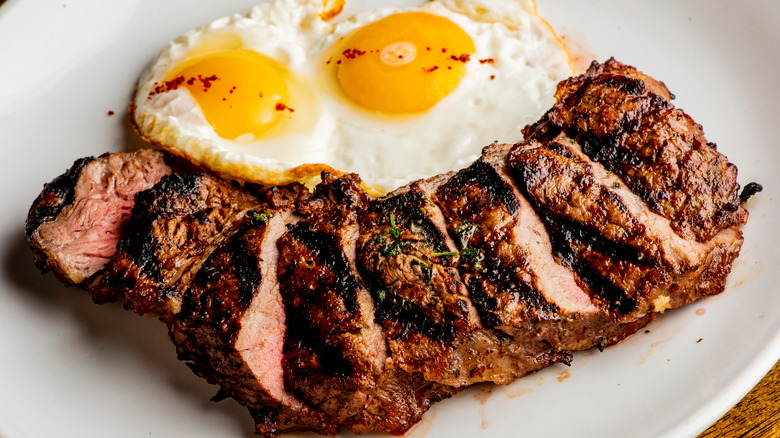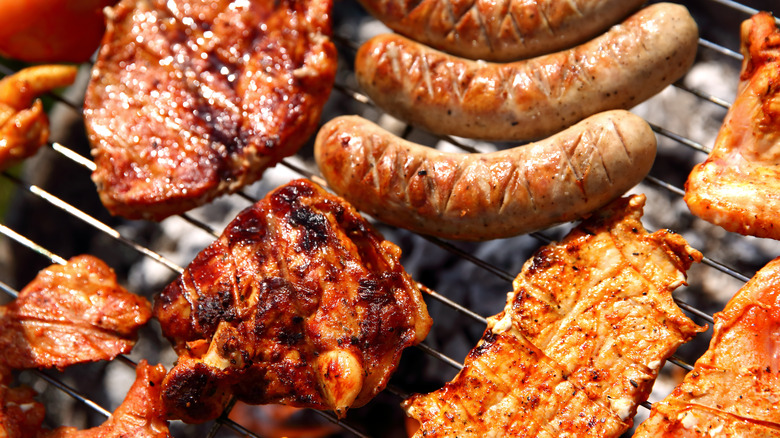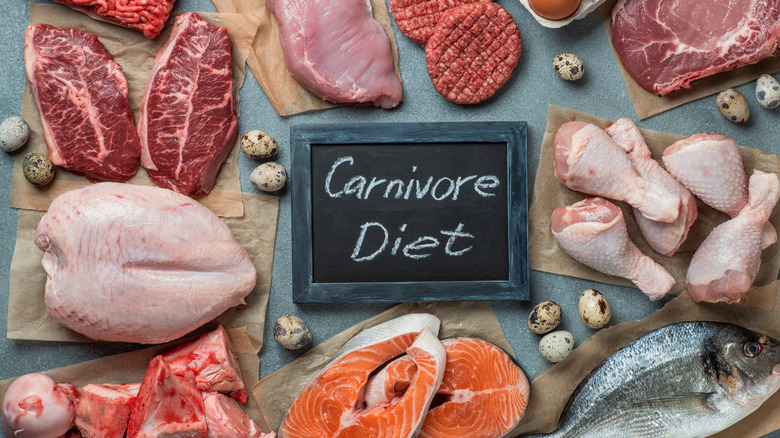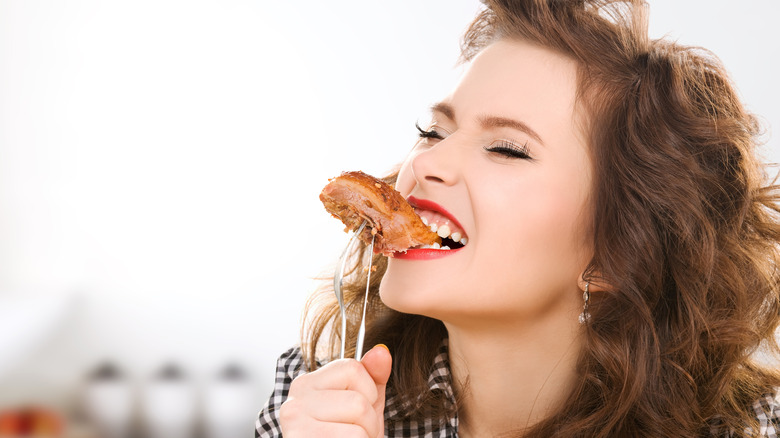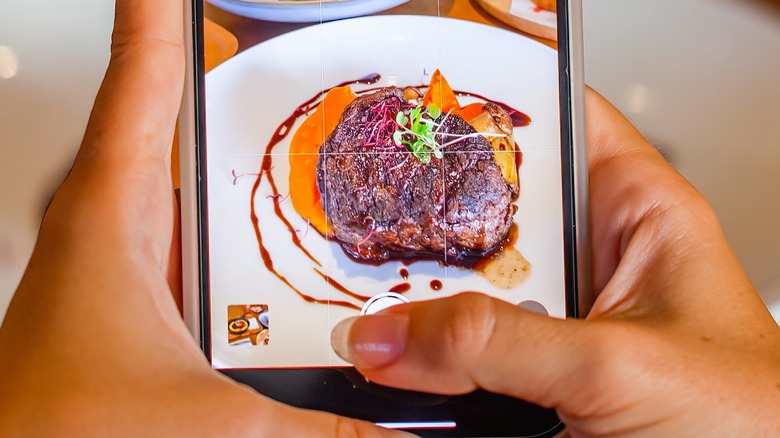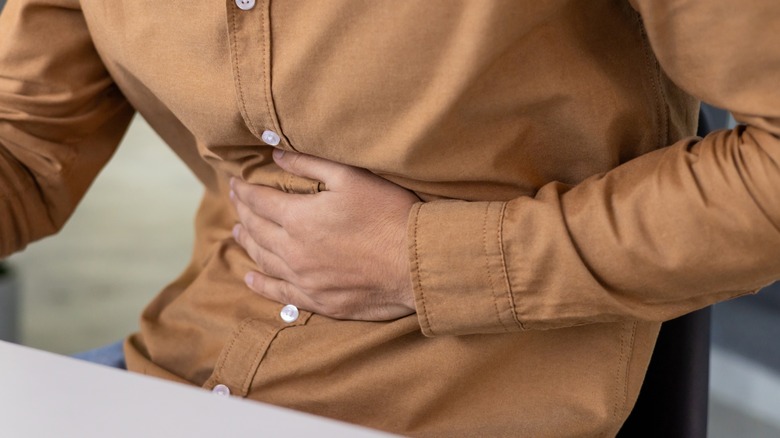Why Your Body Won't Be The Same After The Carnivore Diet
The carnivore diet is easy to explain: Eat animal products and nothing else. Meat, seafood, eggs, and certain dairy products are allowed whereas all plant-based foods are off-limits. It's similar to the paleo or "caveman" diet, which claims to be a return to how our ancient ancestors ate. However, the carnivore diet doesn't include fruits, vegetables, nuts, or seeds. Because the carnivore diet excludes these healthy plant-based foods, it's pretty much a zero-carb diet, with calories coming from protein and (mostly saturated) fat.
While the carnivore diet isn't as trendy as other low-carb diets, like keto or Atkins, it's been floating around the mainstream for a little while. Comedian and podcaster Joe Rogan subscribed to the diet in January 2020 and seemed to stick with it — despite some very colorful complaints about what it does to his bowel movements. Die-hard carnivore diet proponents claim that the eating style leads to extreme weight loss, plus more energy. But the truth is there's really no science to back up these claims. In fact, the carnivore diet could have some pretty nasty effects on your body.
The carnivore diet is about saying yes to meat and no to virtually everything else
One of the only good things about the carnivore diet is that it's very straightforward. Carnivore dieters eat meat, fish, eggs, and dairy products that are low in lactose (the sugar found in milk), like butter and some hard cheeses. Fruits, vegetables, beans, legumes, nuts, seeds, and grains are totally off limits, as are dairy products like milk, yogurt, high-lactose cheeses, and ice cream (via Healthline).
In practice, that might mean eating eggs and bacon for breakfast, a big piece of salmon for lunch, and a steak basted with butter for dinner. Or, you might keep things simple and eat ground beef for all three meals — and snacks. While a meat lover may think this sounds appealing, imagine sticking to this plan day in, day out. You're not allowed any cheats or treats, so being a carnivore dieter means giving up favorites like ice cream, french fries, and pizza. Forever. It also means saying no to delicious things that nutritionists recommend eating, like greens, fruits, and whole grains.
You'll be eating way more meat than is recommended
Something people might find appealing about the carnivore diet is the lack of rules pertaining to how much you should eat, Amy Gorin, registered dietitian nutritionist, told Women's Health. Presumably, you just eat as much as you want, whenever you're hungry. Some carnivore dieters eat up to 4 pounds of meat per day. That's way above the daily recommendation of 2 to 6.5 ounces of meat. Of course, eating that much meat also gets expensive: 4 pounds of sirloin steak costs around $34. Even if you go for cheaper meat, like ground beef, you'll be spending around $19 per day.
Eating that much meat also has some negative environmental impacts. "Meat production is the primary source of methane emissions, a greenhouse gas 86 times more potent than carbon dioxide over a 20-year period, and beef cattle produced over 70% of it via enteric fermentation — belching and farting — in 2016," according to the Sierra Club. Eating meat — especially as much as 4 pounds per day — can lead to a massive carbon footprint.
The carnivore diet is not the same as the keto diet
One important thing to note about the carnivore diet is that it's not necessarily a keto diet. "Whether or not the carnivore diet would put you in ketosis really depends on the specific breakdown of what you're eating," Amy Gorin, registered dietitian nutritionist, told Women's Health. "Eating too much protein with too little fat may make it difficult to stay in ketosis."
You see, the keto diet is all about putting and keeping your body in a state of ketosis, during which it burns fat for energy instead of glucose (which comes from carbs). In order to make this happen, the majority of your calories must come from fat. And while the exact macronutrient breakdown of the keto diet varies depending on who you ask, most experts agree that 55 to 60% of your calories should come from fat, 30 to 35% should come from protein, and less than 5 to 10% should come from carbohydrates.
While the carnivore diet will definitely keep carbs low, it will likely contain more protein and less fat than is necessary for ketosis.
You might lose weight quickly at first
While there are no set menus or portion sizes on the carnivore diet, one thing is for sure: It's very, very low-carb. No matter what combination of animal products you eat every day, you're pretty much guaranteed to be eating lots of fat and protein and virtually no carbohydrates. For most people, eating this way leads to quick weight loss in the first few weeks.
Evidence shows that very low-carb diets — defined as getting fewer than 10% of your calories from carbs (basically guaranteed on the carnivore diet) — often leads to weight loss of up to 10 pounds in two weeks. But it's important to keep in mind that much of this weight loss is due to the diuretic effect of cutting out carbohydrates.
Glucose (the building block of carbohydrates) attracts water; when you stop eating carbs, your body quickly stops holding onto a few pounds of water, leading to weight loss. And weight loss is definitely not the same thing as fat loss.
You won't necessarily keep weight off on the carnivore diet
There are two major issues when it comes to sustaining weight loss on the carnivore diet. First, the weight loss that follows in the first few weeks is due to water loss, not fat loss. Once that's over and your body has shed all the water it can spare, fat loss can begin.
However, studies show that very low-carb, high-protein diets aren't more effective for long-term weight loss than any other diet. In order to lose fat, you need to eat fewer calories than you burn. This might happen on a carnivore diet, since your options are so limited. But if you're eating huge portions of meat, you may not lose much weight.
Another issue with the carnivore diet is that it's really, really hard to sustain. As physician Monique Tello wrote in an article for Harvard Health Publishing, the most effective weight loss plans are the ones you can stick to for life, and research shows that people tend to quit very restrictive diets after a few months.
You won't experience the benefits of grains
If you follow the carnivore diet, you may believe grains are unhealthy and contain harmful anti-nutrients that prevent your body from absorbing important vitamins and minerals. This isn't unique to the carnivore diet, though. Other diets like Whole30 and paleo claim the same thing. The thing is, it's not really true.
As Katherine Pett, registered dietitian nutritionist, explained in Self, that claim is grounded in the fact that two compounds found primarily in whole grains and legumes, phytates and lectins, can cause inflammation and reduce the absorption of certain vitamins and minerals. But in reality, this only happens in less-developed countries where people eat extremely limited diets: only rice, for example.
A 2014 review published in the Journal of Cereal Science looked at the research and found that there's no evidence to support the idea that consuming grains as part of an overall healthy diet has any negative effect, and that in fact whole grains should be part of a healthy diet because of the beneficial nutrients they contain.
This diet can lead to constipation and more serious negative health effects
One very important nutrient that's completely missing in the carnivore diet is fiber. Found in fruits, veggies, whole grains, legumes, nuts, and seeds, fiber is the part of a plant food that your body can't absorb. The two types of fiber serve slightly different functions — soluble fiber becomes a gel in your digestive tract while insoluble fiber is "bulk" that helps move things through your digestive tract. Both types of fiber help keep you regular as well as prevent constipation and diarrhea (via Mayo Clinic). But fiber has health benefits beyond just your bowel movements.
Experts recommend at least 25 grams per day for women and at least 38 grams per day for men as fiber can help lower blood cholesterol levels and control blood sugar levels. Getting adequate fiber is also shown to help with weight loss and weight maintenance because it helps fill you up without adding calories, according to the Mayo Clinic. Because the carnivore diet eliminates plant foods, it delivers close to zero fiber.
The carnivore diet may lead to you becoming nutrient deficient
In addition to missing out on fiber, you'll miss out on the vast array of vitamins and minerals found in fruits and vegetables if you're on the carnivore diet. The 2015-2020 Dietary Guidelines for Americans recommends that adults eat 2 cups of fruit and 2.5 cups of vegetables each day, which is in line with the "5-a-day" recommendation that most of us have been hearing our whole lives. This is for good reason.
Eating adequate fruits and vegetables has so many proven health benefits, including lowering blood pressure, reducing the risk of heart disease and stroke, preventing certain cancers, lowering the risk of eye and digestive diseases, improving blood sugar control, and regulating appetite, according to Harvard's The Nutrition Source. There's so much research to back this up whereas there's no evidence that proves following a carnivore diet can deliver these same benefits.
Cut out fruits and vegetables completely, and you'll miss out not only on the flavor and crunch of fruits and vegetables, but also their bounty of positive health effects.
All the saturated fat you'll consume will increase your risk of heart disease
Sure, it's possible to eat a carnivore diet made up of primarily lean cuts of meat like skinless chicken, pork loin, lean seafood, and fish rich in unsaturated fats. But, let's be real, the chances of completely avoiding butter, cheese, and fatty cuts of meat is extremely unlikely; hardcore carnivore dieters tend to post pictures of meals that contain plenty of steak, bacon, and fried eggs.
The problem? These tasty cuts of meat are very high in saturated fat, which the 2015-2020 Dietary Guidelines for Americans recommends limiting to less than 10% of your total daily calories. This is because, as the American Heart Association explained, saturated fat consumption can raise your "bad" LDL blood cholesterol and increase your risk of heart disease. Additionally, dietary fiber is what helps combat this effect. The carnivore diet is pretty much a recipe for disaster as it calls for consuming more saturated fat and no dietary fiber.
Your blood pressure might go up
The American Heart Association defines high blood pressure, also called hypertension, as having systolic blood pressure (the top number) of 130 or above, and/or diastolic blood pressure (the bottom number) of 80 or above. Having high blood pressure can damage your heart and circulatory system, and is a significant contributor to heart attack, stroke, and other serious health problems.
This is bad news for folks on the carnivore diet. Increased meat consumption, particularly red meat consumption, has been linked to increases in blood pressure, according to the AHA. Americans already eat a significant amount of red meat — 76 grams (about 2.7 ounces) per day on average — but people on the carnivore diet are likely going to eat far more than that.
For reference, a hamburger patty delivers around 4 ounces of red meat, and a single serving of steak is 3 ounces. In short, it would be very difficult to keep red meat to a minimum on the carnivore diet.
Your cholesterol will probably increase on the carnivore diet
First, let's get something straight: Eating a lot of dietary cholesterol doesn't necessarily increase your LDL ("bad") blood cholesterol. Experts used to think this was the case and recommended eating less than 300 milligrams of cholesterol per day. The 2015-2020 Dietary Guidelines for Americans removed this recommendation, though advised "individuals should eat as little dietary cholesterol as possible while consuming a healthy eating pattern" (via Harvard's The Nutrition Source).
It's well-established that eating foods high in saturated fat can raise your LDL cholesterol levels. One 2019 study published in The American Journal of Clinical Nutrition found that increased consumption of both white and red meat can raise your blood cholesterol, which obviously spells trouble for people on the carnivore diet.
According to the Centers for Disease Control and Prevention, having high LDL cholesterol raises risk for heart disease and stroke, two of the leading causes of death in America. And without fiber to combat the effects of cholesterol in the body, carnivore dieters may just be playing a dangerous game.
The carnivore diet could raise your cancer risk
According to the National Cancer Institute, approximately 38.4% of adults will be diagnosed with cancer at some point in their lifetimes. Of course, different cancers vary in severity and have different risk factors. Additionally, some risk factors are modifiable while others are genetic.
Unfortunately, eating too much red or processed meat is linked to an increased risk of colorectal cancer, the second most frequently diagnosed cancer in women and third most frequently diagnosed cancer in men. Red and processed meat includes beef, lamb, bacon, deli meat, hot dogs, sausages, and more.
Cutting out fruits and vegetables, as carnivore dieters must do, may also increase your cancer risk. The evidence shows that increased consumption of micronutrients commonly found in fruits and vegetables — namely vitamin C, vitamin E, and carotenoids (the compound that colors red, yellow, and orange fruits and vegetables) — is associated with a lower risk of cancer and heart disease. And while it's possible to get vitamins C and E through supplements, experts agree that getting nutrients through food is better (via Harvard Health).
This is who popularized the carnivore diet
If the risk factors of the carnivore diet aren't enough to convince you to skip this fad diet, consider this: Shawn Baker, a former orthopedic surgeon who popularized the carnivore diet and wrote a book about it, might not be such a trustworthy health professional. In fact, Baker's medical license was revoked by the state medical board of New Mexico (where he practiced) in 2017 due to, among other things, "incompetence to practice as a licensee."
Baker's license was apparently reinstated in 2018, but the original controversy is still cause for concern. Additionally, Baker has called out journalists who criticize the carnivore diet, calling one reporter's skill at "low level moron." Baker has also taken aim at those who follow vegan diets, reportedly calling such ones "mindless drones," the New York Post reported.
Nevertheless, expert Abby Langer implored readers in an article for Self — fittingly titled "I'm a Registered Dietitian and I Really Don't Want You to Eat a Carnivore Diet" — to avoid this diet at all costs. "Vegetables are good for you, I promise," she wrote.
There's no solid evidence on what exactly the carnivore diet does
Perhaps one of the most, if not the most, compelling reason to avoid the carnivore diet is that we just don't know exactly what it does to your body in the long term. Yes, there's solid evidence that too much saturated fat, red meat, and processed meat isn't great for the body, and that eating plenty of fruits, vegetables, and other fiber-rich foods is beneficial. But because the carnivore diet is a relatively new phenomenon, there are no studies that look at how the carnivore diet affects the body over time.
As dietitian Abby Langer explained in Self, "All the 'evidence' that the diet works comes from personal anecdotes. But anecdotes don't prove whether or not a diet is legit." She also raised a red flag on how restrictive the diet is, explaining that it could lead to disordered eating behaviors and feelings of deprivation and dissatisfaction when it comes to food.
Overall, there's plenty of evidence that the carnivore diet is potentially harmful, and no legitimate evidence that it's beneficial. The bottom line? You'll want to pass on this fad. Go ahead and eat meat if you want, but don't cut out nutritious plant-based foods.
Carnivore influencers: the carnivore diet on social media
The lack of any strong, science-backed evidence on the health benefits of the carnivore diet certainly hasn't stopped social media influencers from hopping on the meat-eating bandwagon. Aside from carnivore diet popularizer Shawn Baker (who has an active social media presence himself), other so-called "meatfluencers" include Courtney Luna, host of the Eat Meat + Question Everything podcast, and Seattle-based vegan-turned-carnivore Bella Ma (aka Steak and Butter Gal).
In an interview with The Guardian, Luna called her carnivore journey "an awakening," and expressed skepticism about research findings on the health risks associated with butter and meat consumption. "Follow the money trail," said Luna. "The higher-ups, they can't make money off of us if we're all healthy and thriving." Meanwhile, Ma has stated that cutting out seed oils and completely replacing them with animal fat has done wonders for her skin and eliminated any need for her to use sunscreen, a claim that was heavily criticized on social media by users as "spreading misinformation" (via The Cut).
Understandably, health experts stress the importance of being careful when it comes to highly restrictive diets. Registered dietitian Danielle Shine warns against adopting diets that are "not sustainable," especially if this is done based solely on anecotal health claims that are not supported by evidence. "I've had people sit in my clinic and tell me they 'feel so much better,' and I'm looking at blood test results with clinical signs and symptoms that are telling me the exact opposite, but it's getting ignored," lamented Shine.
What is the carnivore flu?
An abrupt change in your diet can lead to some side effects, and adopting the carnivore diet is no exception. Per reproductive endocrinologist and carnivore diet advocate Dr. Robert J. Kiltz, MD, the "carnivore flu" is the temporary result of inadequate fat consumption, dehydration, and electrolyte depletion. Some of its most common symptoms include brain fog, bloating, headache, muscle weakness, and fatigue. Others may experience nausea and difficulties in maintaining concentration, as well as diarrhea, stomach pain, or constipation.
The bowel-related disorders associated with the carnivore flu are likely due to fiber deficiency, which typically happens when a person's diet does not include any fiber-rich sources (like the carnivore diet). This lack of fiber in one's diet, coupled with the consumption of high amounts of protein, may also have some long-term effects, including the deterioration of gut health (which has been linked to both gut inflammation and colon cancer risk, per Healthline).

